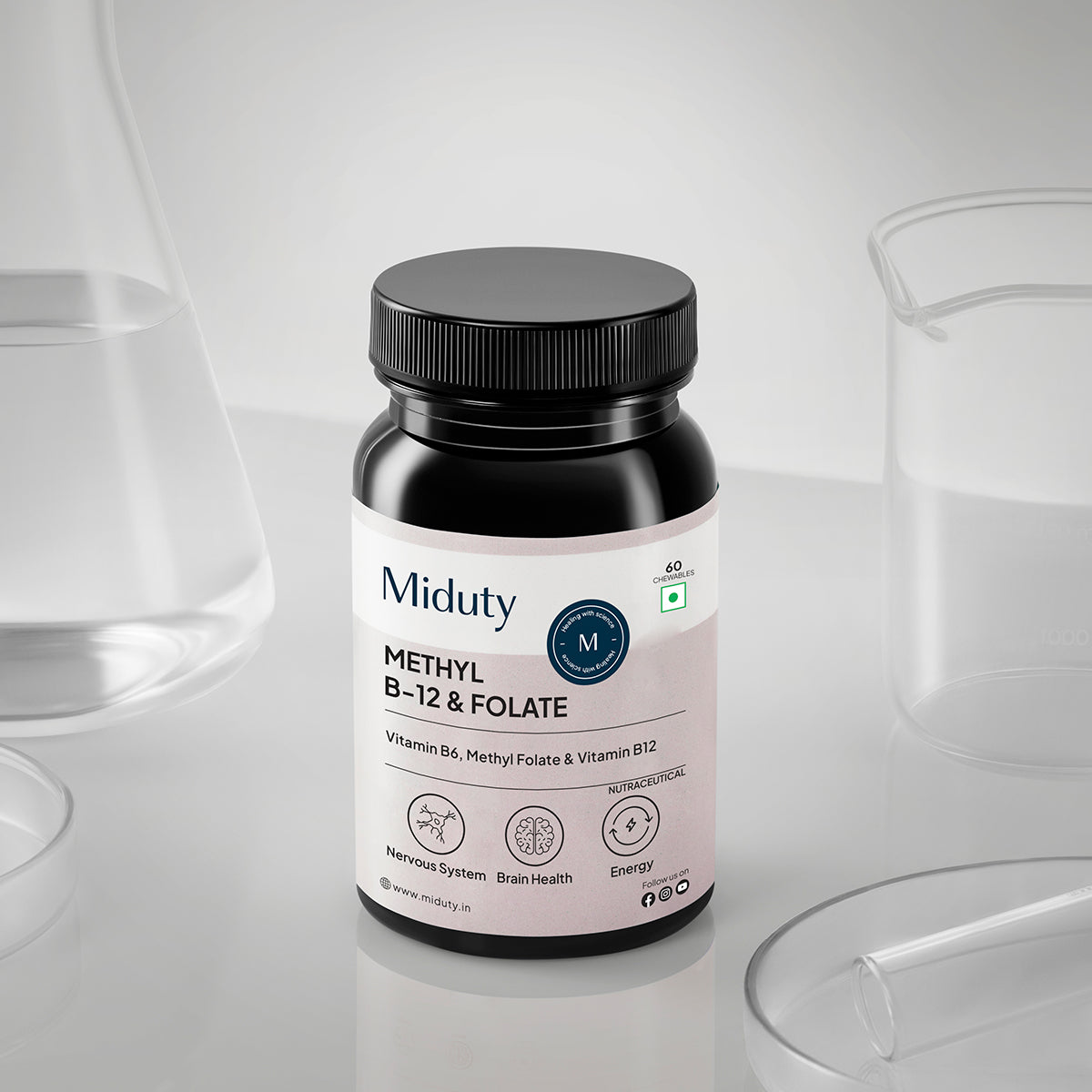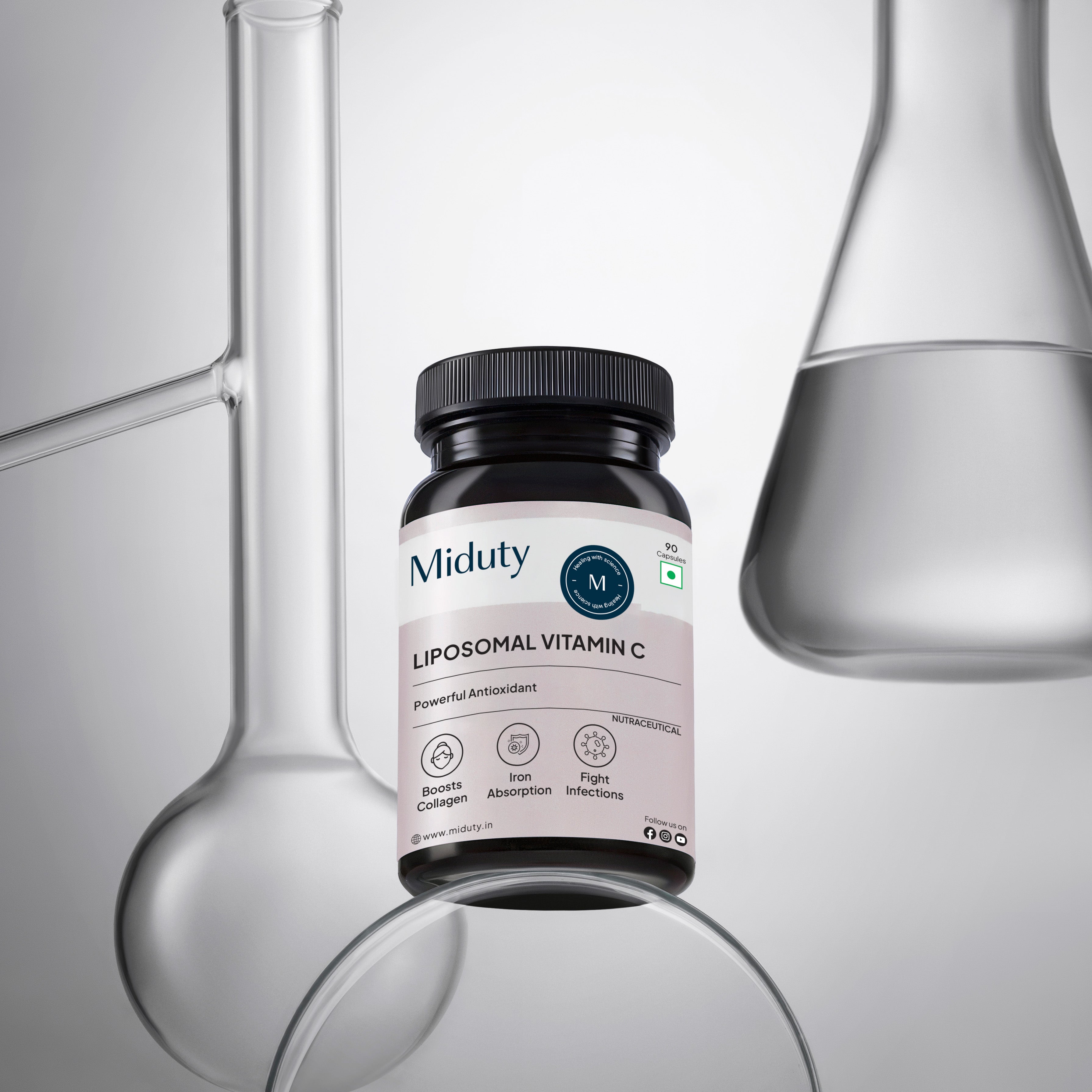
How Vitamin B12 Deficiency Can Lead to Joint Pain?
Key Takeaways
1. Deficiency in Vitamin B12 can cause nerve-related pain, stiffness, and aches that feel like arthritis — especially in the knees, hips, and shoulders.
2. Low B12 increases homocysteine levels, triggering inflammation and oxidative stress that worsen joint and muscle pain.
3. Poor oxygen delivery from low red blood cell count due to B12 deficiency leads to muscle fatigue and joint soreness, making daily movements more painful.
4. A diet rich in B12, folate, and anti-inflammatory foods — plus supplements or injections if needed — can significantly reduce joint pain and improve energy levels.
5. Regular B12 checks, especially for vegans, older adults, and those with digestive issues or on certain medications, can prevent chronic pain and nerve complications.
Have you ever wondered why you feel unusually stiff or achy even though you haven't been working out or injured? For many people, unexplained joint pain could be linked to something unexpected: a vitamin deficiency. Among all essential nutrients, Vitamin B12 plays a surprisingly powerful role in our nerve, muscle, and joint health. Yet, millions of people worldwide suffer from low B12 levels without realizing it.
Vitamin B12 deficiency is known for causing fatigue, weakness, numbness, and cognitive issues. However, one of its lesser-known but significant effects is joint and muscle pain. Because B12 directly supports the nervous system and red blood cell production, a deficiency can lead to pain that feels similar to arthritis or fibromyalgia. [1]
In this blog, let's know the science of how Vitamin B12 deficiency can contribute to joint pain, the signs to look out for, and how to treat and prevent it effectively. If you've been struggling with unexplained aches, this might be the key piece of the puzzle your body's been trying to tell you.
The Connection Between Vitamin B12 Deficiency and Joint Pain
At first glance, Vitamin B12 and joint pain don't seem related. After all, one is a vitamin, and the other is a musculoskeletal issue. But here's where the body's complexity shines through: joint pain can be a neurological symptom triggered by low B12. [6]
When your body lacks enough B12:
- Nerves that control muscle and joint function begin to misfire. This leads to sensations of stiffness, aching, or shooting pain.
- Inflammatory markers increase. Some research shows that B12 deficiency can contribute to elevated homocysteine levels, which may cause inflammation in the joints and connective tissues.
- Muscle weakness develops. Weak muscles can strain joints, causing secondary pain that feels similar to arthritis.
What's more, the pain may not respond to typical anti-inflammatory medications because it's neuropathic, not inflammatory, in origin. This is why some people find their joint pain resolves only after correcting their Vitamin B12 levels.
How Vitamin B12 Deficiency Can Lead to Joint Pain?
While Vitamin B12 isn't directly responsible for lubricating or cushioning joints, its impact on nerves, red blood cells, and inflammation can lead to symptoms that mimic or worsen joint pain.
Here's how low B12 levels may contribute to pain in joints and muscles:
1. Nerve-Related Pain
Vitamin B12 deficiency can cause nerve damage (neuropathy), leading to pain, tingling, or numbness in extremities. When nerves that connect to joints or surrounding muscles are affected, the pain may feel like it's coming from the joints themselves. This pain is often mistaken for joint or muscle pain especially in areas like knees, hips, and shoulders.
2. Inflammation and Oxidative Stress
Low levels of Vitamin B12 can increase homocysteine in the blood, a compound linked to inflammation and oxidative stress. High homocysteine levels are associated with joint stiffness and inflammatory joint conditions like rheumatoid arthritis [2], [3]
3. Muscle Weakness and Fatigue
Deficiency reduces red blood cell production, resulting in poor oxygen delivery to muscles and tissues. This causes muscle fatigue, weakness, and soreness, which may be felt around joints.
4. Bone and Cartilage Health
Studies show that chronic B12 deficiency can reduce bone mineral density and may increase fracture risk. Weakened bones and reduced cartilage repair can make joints more susceptible to wear, tear, and discomfort. [4]
Who Is at Risk of Vitamin B12 Deficiency?
Several factors can increase your risk of developing low Vitamin B12 levels:
1. Vegetarians and vegans – Since Vitamin B12 is mostly found in animal products, vegetarians and especially vegans are at high risk of deficiency. While some plant-based foods are fortified with B12, regular supplementation is essential in these cases.
2. Elderly individuals – Reduced stomach acid makes absorption difficult. People over 50 often experience atrophic gastritis, making it harder to absorb B12 naturally.
3. People with digestive issues – Conditions like Crohn's disease, celiac disease, or IBS can reduce nutrient absorption.
4. Patients on certain medications – Long-term use of antacids, metformin, or proton pump inhibitors (PPIs) can lower B12 absorption.
5. Individuals with autoimmune diseases – Such as pernicious anemia, which prevents B12 absorption.
6. Alcohol and Smoking - Excessive alcohol consumption damages the stomach lining and impairs nutrient absorption. Smoking, on the other hand, increases oxidative stress and lowers Vitamin B12 concentrations in the bloodstream.
How to Fix Vitamin B12 Deficiency for Joint Health
If low B12 is contributing to your joint pain, fixing the deficiency can help reduce symptoms and restore your energy and mobility.
1. Dietary Sources
Include rich sources of Vitamin B12 in your diet, such as:
- Fish (salmon, tuna)
- Eggs
- Dairy products (cheese, yogurt)
- Poultry and lean meats
- Plant-based milks (almond, oat) (for vegetarians/vegans)
- Pairing B12-rich foods with folate (like spinach or lentils) enhances red blood cell formation and improves energy.
- Healthy gut bacteria play a key role in B12 absorption. Eating probiotic-rich foods like yogurt, kefir, kimchi, or sauerkraut supports digestion and overall nutrient uptake.
A well-balanced diet not only replenishes B12 but also provides other joint-supporting nutrients like Vitamin D, calcium, and Omega-3 fatty acids.
2. Anti-inflammatory Foods for Joint Health
To reduce stiffness and inflammation, add the following:
- Fatty fish (salmon, sardines): Packed with Omega-3 fatty acids that reduce joint swelling.
- Turmeric: Contains curcumin, known for its potent anti-inflammatory properties.
- Berries: Rich in antioxidants that combat oxidative stress.
- Leafy greens: Spinach and kale provide magnesium and calcium for bone support.
- Nuts and seeds: Almonds, chia seeds, and walnuts contain healthy fats for joint lubrication.
3. Vitamin B12 Supplements
If dietary intake isn't enough, consider Vitamin B12 supplements. These are available in several forms:
- Tablets or capsules – Easy for daily use.
- Injections – For those with severe deficiency or poor absorption.
Look for supplements containing Methylcobalamin, the most active and bioavailable form of Vitamin B12. For best results, combine B12 with Folate (Vitamin B9) and Vitamin B6, which help regulate homocysteine levels and support nerve and joint health.
4. Lifestyle Adjustments
- Regular exercise, hydration, and sufficient rest help reduce inflammation and improve blood flow to joints. Combining B12 therapy with low-impact activities like swimming, yoga, or cycling can further enhance recovery.
- Even if you eat well, absorption issues can still cause deficiency. Regular blood tests every 6–12 months, especially for older adults or vegetarians, can catch declining levels early.
- Both alcohol and smoking impair nutrient absorption and reduce the body's ability to utilize B12 effectively. Cutting back not only preserves your B12 levels but also reduces inflammation that contributes to joint pain.
5. Pain Management
For severe pain, a combination of physical therapy, massage, and gentle stretching can help relieve tension. Over-the-counter anti-inflammatory medications can provide temporary relief, but they don't address the root cause so always focus on restoring B12 levels first.
Daily Vitamin B12 dosage
The Recommended Dietary Allowance (RDA) for Vitamin B12 varies by age and condition: [5]
- Adults: 2.4 micrograms/day
- Pregnant women: 2.6 micrograms/day
- Breastfeeding women: 2.8 micrograms/day
Maintaining these levels is essential not only for energy and mental focus but also for pain-free movement and joint health that mimics arthritis or chronic inflammation.
Conclusion
The connection between Vitamin B12 deficiency and joint pain is real, though often overlooked. Early detection and intervention can reverse symptoms and restore vitality. A nutrient-rich diet, supplemented with regular testing and mindful living, is your best defense.
If you're feeling persistent fatigue, tingling, or unexplained joint stiffness, it might be time to check your B12 levels. Treating the root cause could help to move freely again without pain holding you back.
FAQ's on Vitamin B12 Deficiency and Joint Pain -
Q1 - Does low B12 cause joint pain?
Yes, a severe vitamin B12 deficiency can lead to joint pain, although it's not one of the most common symptoms. Other possible signs include fatigue, anemia, and nerve-related issues such as tingling or numbness. A doctor can confirm a B12 deficiency through blood tests and recommend appropriate treatment, typically involving supplements or injections.
Q2 - What vitamin am I lacking if my joints hurt?
Joint pain can be associated with deficiencies in vitamin D and, in some cases, vitamin C. Low levels of vitamin D can lead to weakened bones and increased inflammation, which may contribute to conditions such as osteoarthritis and rheumatoid arthritis. A severe vitamin C deficiency (scurvy) can also cause joint pain, brittle bones, and other related health problems.
Q3 - Can B12 reduce joint pain?
Yes, vitamin B12 can help reduce joint pain, particularly in cases of deficiency, due to its analgesic, neuroprotective, and anti-inflammatory properties. It plays a vital role in maintaining nerve health, promoting nerve repair, and supporting proper nervous system function, which can improve pain perception. Supplementing with B12 may be a beneficial part of a pain management plan for individuals with confirmed deficiency, but it's important to consult a healthcare professional before starting any new supplement regimen.
Q4 - Can B12 deficiency cause walking problems?
Yes, a vitamin B12 deficiency can lead to walking difficulties, including problems with balance, coordination, and an unsteady or staggering gait. This occurs because B12 is essential for producing myelin, the protective sheath around nerves and a deficiency can impair nerve signaling, resulting in neurological symptoms that affect movement and stability.
Q5 - Can low B12 cause achy legs?
Yes, a vitamin B12 deficiency can cause aching in the legs through several mechanisms. It can lead to peripheral neuropathy, resulting in nerve damage that produces sensations such as tingling, burning, or pain. Additionally, muscle weakness and cramps may occur due to impaired nerve function and reduced oxygen delivery to tissues caused by anemia associated with low B12 levels.
References












